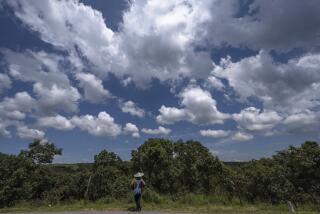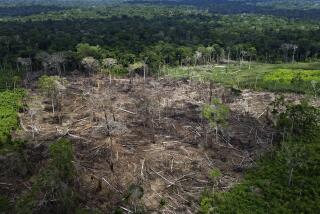Congo’s Logging Reform Not So Clear-Cut
LAKE TUMBA, Congo — Pygmy chief Mbomba Bokenu says he may soon let loggers cut his people’s forest, and all he expects in return is soap and a few bags of salt.
“The Pygmies are suffering; we accept what we are given,” said Bokenu, draped in brown civet-cat skins and holding a slender carved-wood shield. “Our children live in dirt, they suffer from disease. Soap and salt are a lot to our people.”
The Pygmies, though, are entitled to demand much more under proposed government rules meant to ensure Congo’s forest communities benefit from the wealth around them.
But experts question whether the Pygmies, who are poor and illiterate -- the result of years of government neglect and discrimination by ethnic Bantus -- will be able to use the law to help themselves.
“People who do not have money for clothes are not in a position to apply the forestry code in a reasonable manner,” said Richard Mboyo, head anthropologist at the Democratic Republic of Congo’s Center for Ecology and Forestry, a government research institution in the northwestern province of Equator.
“Some of the tribes are facing the modern world for the first time. They don’t understand the value of their trees,” said Mboyo, who has researched the vast Central African country’s forest communities for more than two decades.
A 1998-2002 war left Congo’s economy a shambles, but with peace largely restored and democracy on the horizon, private businesses have returned, lured by a vast forest still largely intact. Congo, formerly Zaire, has about 300 million acres of precious woodland -- the world’s second largest rain forest and half of Africa’s total.
Pygmy chief Bokenu said he knew that some Bantus, who were more educated and Westernized, had negotiated for hospitals in return for allowing logging in their forests. But when asked if the Pygmies would ask for one as well, he said, “We are not educated enough to ask for hospitals and schools.”
Mboyo thinks it will take years of diligent work to teach Pygmies their rights and how to use the law.
If Pygmies sign away their forest rights for soap and salt, the government may not be able to protect them, even if it wants to. And that would be a big change: Congo’s past governments have shown little inclination to help the Pygmies.
Under current laws, timber companies, which are mostly Congolese, buy logging permits from officials in the capital, Kinshasa, and locals are bypassed. In the past, the government funneled little of the permit revenue to forest communities as much of Congo’s wealth was stolen or squandered by its leaders.
The new code, to be enforced by the government and expected to take effect in the fall, calls for 15% of government revenue from logging to be returned to communities adversely affected by the industry. The World Bank-supported code also requires timber companies to negotiate with locals before they start logging.
Loggers oppose the new code, saying it puts a burden on them that should be shouldered by government.
“One cannot expect companies to make schools and roads for the people. That is the government’s domain,” said Florentin Kage, president of Congo’s logging industry lobby. “Our government doesn’t work for the people. Now it wants us to.”
There are other reasons for loggers to protest.
The new code gives government officials the power to revoke logging concessions at any time, leaving businesses at their continual mercy.
In the past, a large one-time payment to officials was sufficient to obtain a multiyear concession. Under the new law, loggers might have to constantly grease politicians’ palms, even after committing machinery and large investments to the forests.
Proponents of the code insist that the government will protect poor people and make amends for years of official abuses.
President Joseph Kabila ordered all forest concessions to be renewed last October, a measure that Environment Ministry officials say is an attempt to weed out illegal dealings that led to large swaths of forest being handed to fraudulent businesses.
“The people will now have authority over their forests. If they say, ‘We don’t want logging,’ it will be respected,” said Joseph Sudi, a senior Environment Ministry official.
Sudi, though, also hinted at other pressures on the government.
“Congo needs its forests to start paying up,” he said, noting that international donors and Congo’s government view logging as a way to pay off billions in foreign debt accumulated during three decades of dictatorial rule and a decade of war.
The Pygmies, meanwhile, are preparing to relinquish centuries-old sacred forests preserved by their ancestors.
“I will tell the spirit of the forest that his trees must be cut down,” said Bokenu, the chief. “It is so his people can survive.”
More to Read
Sign up for Essential California
The most important California stories and recommendations in your inbox every morning.
You may occasionally receive promotional content from the Los Angeles Times.










